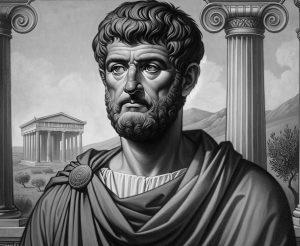Polybius ancient Greek historian 200 BC
 Polybius was an ancient Greek historian, born around 200 BC. He is best known for his work, “The Histories,” which covered the period of 264–146 BC in detail. This work is particularly valuable because it provides a detailed account of the Roman Republic’s rise to dominance, culminating in the destruction of Carthage and Corinth in the Third Punic and Achaean Wars, respectively.
Polybius was an ancient Greek historian, born around 200 BC. He is best known for his work, “The Histories,” which covered the period of 264–146 BC in detail. This work is particularly valuable because it provides a detailed account of the Roman Republic’s rise to dominance, culminating in the destruction of Carthage and Corinth in the Third Punic and Achaean Wars, respectively.
Polybius was taken to Rome as a hostage in 167 BC, where he became closely associated with the Scipio family, gaining access to circles of power and influence. This position allowed him a unique perspective on Roman politics, military strategies, and culture, which he meticulously documented in his writings.
His work is also noted for its emphasis on the importance of a mixed constitution and the balance of powers within the state, which later influenced the development of republican ideas in the Western political tradition, including the framers of the United States Constitution.
Polybius’s histories are a vital source for understanding the Hellenistic world and the Roman Empire’s early history. His methodology, emphasizing eyewitness accounts and critical evaluation of sources, has also been praised for its contribution to the development of historical methodology.
Early Life and Education
Growing up in a politically influential family, he received a well-rounded education that shaped his future pursuits. His father Lycortas was an esteemed statesman and general who played a significant role in Polybius’ upbringing.
Polybius’ early exposure to politics and military affairs laid the foundation for his later work as a historian. He traveled extensively throughout Greece and beyond, gaining first-hand knowledge of different cultures and systems of governance. This broadened perspective greatly influenced his approach to writing history.
Studying under the guidance of prominent scholars of his time, such as Panaetius and Scipio Aemilianus, Polybius honed his skills in critical thinking and analysis. His dedication to learning and intellectual curiosity set him apart from his contemporaries, shaping him into one of the most respected historians of antiquity.
Accomplishments and Contributions to Ancient Greece
Polybius, a prominent historian in ancient Greece, made significant contributions to the understanding of politics, warfare, and history itself. His most notable accomplishment was his work “The Histories,” which chronicled the rise of Rome and its political systems. Through his meticulous research and detailed accounts of military campaigns, Polybius provided invaluable insights into the mechanics of power and governance.
One of Polybius’ key contributions was his development of the concept of anacyclosis, or the cycle of political regimes evolving from monarchy to tyranny to aristocracy to oligarchy and back again. This theory laid the groundwork for modern political science studies on governmental structures and transitions.
Furthermore, Polybius emphasized the importance of eyewitness accounts in historical writing, setting a standard for future historians to prioritize accuracy and reliability in their narratives. His dedication to factual evidence has influenced generations of scholars striving for historical authenticity.
Polybius’ Influence on Modern Historians
Polybius’ impact on modern historians is profound and far-reaching. His meticulous approach to recording historical events and analyzing political systems has set a standard for scholarly research that continues to be influential today. Modern historians often look to Polybius as a model of how to critically assess sources, consider multiple perspectives, and present a comprehensive narrative.
His emphasis on the importance of understanding causation in history has shaped the way contemporary historians approach their work. By highlighting the interconnectedness of different factors in shaping events, Polybius has encouraged modern scholars to adopt a more holistic view of history.
Furthermore, his insights into the rise and fall of empires have provided valuable lessons for understanding global power dynamics in the present day. Many contemporary historians draw upon Polybius’ theories when studying geopolitical relationships and analyzing shifts in international influence.
Polybius’ influence on modern historians cannot be overstated. His analytical techniques and philosophical reflections continue to inform historical scholarship across various disciplines.
Controversies Surrounding Polybius’ Work
Polybius, the renowned ancient Greek historian, is not without his fair share of controversies surrounding his work. One of the most debated aspects of Polybius’ writings is his alleged bias towards the Roman Republic due to his close relationship with Roman general Scipio Aemilianus. Critics argue that this friendship may have influenced Polybius’ historical accounts and painted a more favorable image of Rome.
Another controversy revolves around Polybius’ theory on anacyclosis, which suggests that governments follow a cyclical pattern of evolution from monarchy to tyranny to democracy and back again. While some historians praise this theory for its insight into political systems, others criticize it as oversimplified and lacking nuance.
Furthermore, there are debates about the accuracy of certain details in Polybius’ works, with some scholars questioning the reliability of specific events or timelines documented by him. These controversies add layers of complexity to understanding Polybius’ legacy in Greek history and continue to spark scholarly debate among historians and enthusiasts alike.
